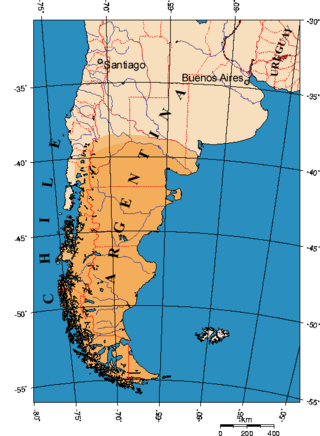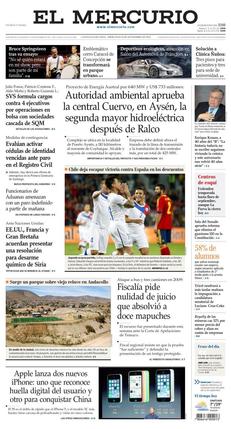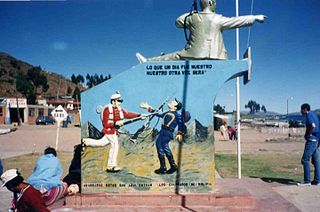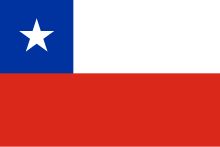
Chile, officially the Republic of Chile, is a country in western South America. It is the southernmost country in the world and the closest to Antarctica, stretching along a narrow strip of land between the Andes Mountains and the Pacific Ocean. Chile had a population of 17.5 million as of the latest census in 2017 and has a territorial area of 756,102 square kilometers (291,933 sq mi), sharing borders with Peru to the north, Bolivia to the northeast, Argentina to the east, and the Drake Passage to the south. The country also controls several Pacific islands, including Juan Fernández, Isla Salas y Gómez, Desventuradas, and Easter Island, and claims about 1,250,000 square kilometers (480,000 sq mi) of Antarctica as the Chilean Antarctic Territory. The capital and largest city of Chile is Santiago, and the national language is Spanish.

Patagonia is a geographical region that encompasses the southern end of South America, governed by Argentina and Chile. The region comprises the southern section of the Andes Mountains with lakes, fjords, temperate rainforests, and glaciers in the west and deserts, tablelands, and steppes to the east. Patagonia is bounded by the Pacific Ocean on the west, the Atlantic Ocean to the east, and many bodies of water that connect them, such as the Strait of Magellan, the Beagle Channel, and the Drake Passage to the south.

Los Jaivas is a Chilean musical group who perform in folk, rock, psychedelic, and progressive rock styles formed in 1963 in Viña Del Mar, Chile. They are considered one of the most important and influential artists of all time in Latin America.

The Mapuche also known as Araucanians are a group of indigenous inhabitants of south-central Chile and southwestern Argentina, including parts of Patagonia. The collective term refers to a wide-ranging ethnicity composed of various groups who share a common social, religious, and economic structure, as well as a common linguistic heritage as Mapudungun speakers. Their homelands once extended from Choapa Valley to the Chiloé Archipelago and later spread eastward to Puelmapu, a land comprising part of the Argentine pampa and Patagonia. Today the collective group makes up over 80% of the indigenous peoples in Chile and about 9% of the total Chilean population. The Mapuche are concentrated in the Araucanía region. Many have migrated from rural areas to the cities of Santiago and Buenos Aires for economic opportunities, more than 92% of the Mapuches are from Chile.

Los Ángeles is the capital of the province of Bío Bío, in the commune of the same name, in Bío Bío, in the center-south of Chile. It is located between the Laja and Biobío rivers. The population is 186,671 inhabitants. The municipality ("comuna") of Los Ángeles has the highest absolute rural population of any Chilean municipality.

An authoritarian military dictatorship ruled Chile for seventeen years, between 11 September 1973 and 11 March 1990. The dictatorship was established after the democratically elected socialist government of Salvador Allende was overthrown in a coup d'état backed by the United States on 11 September 1973. During this time, the country was ruled by a military junta headed by General Augusto Pinochet. The military used the breakdown of democracy and the economic crisis that took place during Allende's presidency to justify its seizure of power. The dictatorship presented its mission as a "national reconstruction". The coup was the result of multiple forces, including pressure from conservative groups, certain political parties, union strikes and other domestic unrest, as well as international factors.
Chilean rock is rock music and its corresponding subgenres produced in Chile or by Chileans. Chilean rock lyrics are usually sung in Spanish so can be considered as part of rock en español, although they are sometimes sung in English as well.

Los Prisioneros was a Chilean rock band formed in San Miguel, Santiago, in 1982. Considered one of the most influential Latin-American bands of all time, they've been evaluated as pioneers of Rock en español by Latin American media and musicians, and one of the strongest socio-political impactful bands in Chile. The group would develop a new wave sound that would have its roots in British punk rock, in particular The Clash, and would incorporate rockabilly, reggae and ska influences, and later synthpop, and would make themselves known for their controversial, witty and subversive lyricism that criticized the socio-economic structures, education and societal attitudes of dictatorship-era Chile and Latin America as a whole. This would cause their music to be banned by the Chilean mainstream media between 1985 and 1990, but their music would continue to spread there, aided by word of mouth and shared homemade cassette tapes.

El Mercurio is a Chilean newspaper with editions in Valparaíso and Santiago. El Mercurio is owned by El Mercurio S.A.P., which operates a network of 19 regional dailies and 32 radio stations across the country.

Gomortega keule is a species of tree endemic to Chile. It is the sole species of the genus Gomortega and, according to the APG IV system of 2016, of the monotypic family Gomortegaceae, assigned to the order Laurales in the clade magnoliids.

The Crossing of the Andes was one of the most important feats in the Argentine and Chilean wars of independence. A combined army of Argentine soldiers and Chilean exiles crossed the Andes mountains, which separate Argentina from Chile, to invade Chile, leading to its liberation from Spanish rule.

Huachipato FC is a Chilean football club based in Talcahuano that currently plays in the Chilean Primera División. Huachipato was founded on 7 June 1947 by workers of the homonymous steel mill in Talcahuano, and it currently plays its home games at the Estadio Huachipato-CAP Acero, which it owns, making it one of the five Chilean professional football clubs to own their own ground. Originally a multisports club, Huachipato became a football club in 2015.
Los Andes, founded on July 31, 1791 as Santa Rosa de Los Andes, is a Chilean city and commune located in the province of the same name, in Valparaíso Region. It lies on the route between Santiago and Chile's primary border crossing with Argentina by way of the summit of the Uspallata Pass in the Andes mountain range.
The División Mayor del Básquetbol de Chile, DIMAYOR, was one of the national professional basketball leagues in Chile, along with the Liga Nacional Movistar. The league was created in 1979 and was discontinued in 2013.

The Conquest of Chile is a period in Chilean historiography that starts with the arrival of Pedro de Valdivia to Chile in 1541 and ends with the death of Martín García Óñez de Loyola in the Battle of Curalaba in 1598, and the subsequent destruction of the Seven Cities in 1598–1604 in the Araucanía region.

Chilean cinema refers to all films produced in Chile or made by Chileans. It had its origins at the start of the 20th century with the first Chilean film screening in 1902 and the first Chilean feature film appearing in 1910. The oldest surviving feature is El Húsar de la Muerte (1925), and the last silent film was Patrullas de Avanzada (1931). The Chilean film industry struggled in the late 1940s and in the 1950s, despite some box-office successes such as El Diamante de Maharajá. The 1960s saw the development of the "New Chilean Cinema", with films like Three Sad Tigers (1968), Jackal of Nahueltoro (1969) and Valparaíso mi amor (1969). After the 1973 military coup, film production was low, with many filmmakers working in exile. It increased after the end of the Pinochet regime in 1989, with occasional critical and/or popular successes such as Johnny cien pesos (1993), Historias de Fútbol (1997) and Gringuito (1998).

Anti-Chilean sentiment or chilenophobia refers to the historical and current resentment towards Chile, Chileans, or Chilean culture. Anti-Chilean sentiment is most prevalent among Chile's neighbors Argentina, Bolivia and Peru. Most recently even wider anti-Chilean sentiment comes from countries such as Colombia, Haiti and Venezuela.
As an archaeological culture, the Mapuche people of southern Chile and Argentina have a long history which dates back to 600–500 BC. The Mapuche society underwent great transformations after Spanish contact in the mid–16th century. These changes included the adoption of Old World crops and animals and the onset of a rich Spanish–Mapuche trade in La Frontera and Valdivia. Despite these contacts Mapuche were never completely subjugated by the Spanish Empire. Between the 18th and 19th century Mapuche culture and people spread eastwards into the Pampas and the Patagonian plains. This vast new territory allowed Mapuche groups to control a substantial part of the salt and cattle trade in the Southern Cone.













